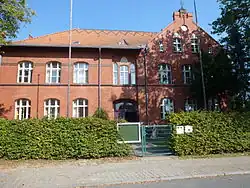Steglitz-Zehlendorf
Steglitz-Zehlendorf (German: [ˌʃteːɡˌlɪt͡s ˈt͡seːlənˌdɔʁf] ⓘ) is the sixth borough of Berlin, formed in Berlin's 2001 administrative reform by merging the former boroughs of Steglitz and Zehlendorf.
Steglitz-Zehlendorf | |
|---|---|
 Flag  Coat of arms | |
Location of Steglitz-Zehlendorf in Berlin .svg.png.webp) | |
 Steglitz-Zehlendorf 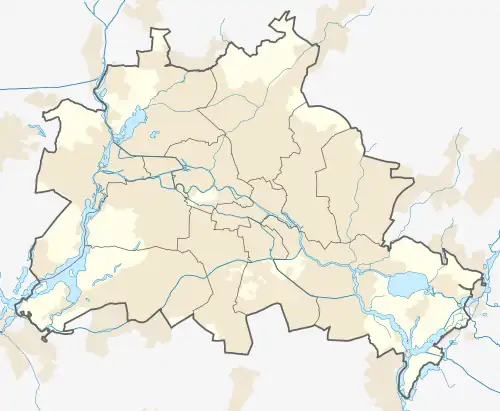 Steglitz-Zehlendorf | |
| Coordinates: 52°26′N 13°15′E | |
| Country | Germany |
| State | Berlin |
| City | Berlin |
| Subdivisions | 8 localities |
| Government | |
| • Mayor | Maren Schellenberg (Greens) |
| Area | |
| • Total | 102.5 km2 (39.6 sq mi) |
| Population (2020-12-31)[1] | |
| • Total | 308,840 |
| • Density | 3,000/km2 (7,800/sq mi) |
| Time zone | UTC+01:00 (CET) |
| • Summer (DST) | UTC+02:00 (CEST) |
| Postal codes | 12157, 12161, 12163, 12165, 12167, 12169, 12203, 12205, 12207, 12209, 12247, 12249, 14109, 14129, 14163, 14165, 14167, 14169, 14193, 14195 |
| Vehicle registration | B |
| Website | Official homepage |
Home to Free University of Berlin, the Berlin Botanical Garden, and a variety of museums and art collections, Steglitz-Zehlendorf is an important hub for research, science and culture in Berlin. It is known to be the wealthiest borough of Berlin, having the city's highest median household income.[2]
History
The first mention of a present-day locality in the district by name was Lankwitz (Lancewitz) in 1239. It is assumed that Slavic and German settlements were established at the Schlachtensee and Krume Lanke lakes after 1200 at the latest. The first documented mention of Zehlendorf (then Cedelendorp) dates back to 1242. Here the Lehnin Abbey bought the settlement and kept it until 1542. Frederick the Great donated a church to the village in 1768 during a stopover on the journey from the Berlin Palace to the Sanssouci Palace. The settlement was located halfway between the two places, which gave the village an economic boost through its function as a relay station. Steglitz also originated in the first half of the 13th century as a Linear settlement. At the end of this century the wooden church was replaced with the village church Steglitz. It stood until the 19th century, when it was replaced by Matthew's Church.[3]
Today's double district is still characterized by connecting infrastructure between Berlin and Potsdam. For example, the first section of the Reichsstraße 1 was routed through Steglitz and Zehlendorf (paved in 1792). In 1838, the Stammbahn was opened parallel to this. This development of the suburbs led to a strong growth of the settlements. Steglitz became the largest rural municipality in Prussia around 1900 with 80,000 inhabitants. The former districts of Steglitz and Zehlendorf were formed in 1920 during the formation of Greater Berlin from previously independent rural communities and estate districts of the Teltow district. The entire area of the present district belonged to the American Sector of Berlin after the Second World War from 1945 to 1990, together with the districts of Tempelhof, Schöneberg, Neukölln and Kreuzberg. In 2001, the two formerly independent districts were merged to form the district of Steglitz-Zehlendorf as part of Berlin's administrative reform. In December 2020, the new Locality Schlachtensee was founded on the initiative of local residents.[4]
Demographics
As of 2021, Steglitz-Zehlendorf had a population of roughly 306 000, making it the fifth most populous out of Berlin's twelve boroughs. The median age was 46,5, the highest of all Berlin boroughs. 28,8% of Steglitz-Zehlendorf residents had a migration background, lying under the Berlin average of 36%.[5]
Steglitz-Zehlendorf has the highest number of Abitur (secondary education degree) graduates in Berlin. The borough also has the highest median household income and the lowest unemployment rate in Berlin. With 15% of Steglitz-Zehlendorf households making more than 200% of the German national median income, it is the wealthiest Berlin borough.[2]
| Percentage of the population with migration background[6] | |
|---|---|
| Germans without migration background/Ethnic Germans | 76% (223.400) |
| Germans with migration background/Foreigners | 24% (70.600) |
| – Middle Eastern/Muslim migration background (Turkey, Arab League, Iran etc.) | 4.5% (13.200) |
| – Polish migration background | 3.0% (9.800) |
| – Yugoslavian migration background | 1.5% (4.000) |
| – Afro-German/African background | 1.1% (3.000) |
| – Others ( Greeks, Italians, East Asians etc.) | 14.0% (40.600) |
Subdivision
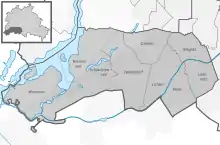
Since December 2020, the Steglitz-Zehlendorf borough consists of eight localities:
| Localities and Neighborhoods |
|---|
| 0601 Steglitz |
| 0602 Lichterfelde |
| 0603 Lankwitz |
| 0604 Zehlendorf |
| 0605 Dahlem |
| 0606 Nikolassee |
| 0607 Wannsee |
| 0608 Schlachtensee |
Politics
District council
The governing body of Steglitz-Zehlendorf is the district council (Bezirksverordnetenversammlung). It has responsibility for passing laws and electing the city government, including the mayor. The most recent district council election was held on 26 September 2021, and the results were as follows:
| Party | Lead candidate | Votes | % | +/- | Seats | +/- | |
|---|---|---|---|---|---|---|---|
| Christian Democratic Union (CDU) | Cerstin Richter-Kotowski | 48,961 | 27.2 | 17 | ±0 | ||
| Alliance 90/The Greens (Grüne) | Maren Schellenberg | 40,184 | 22.4 | 14 | |||
| Social Democratic Party (SPD) | Carolina Böhm | 39,079 | 21.7 | 13 | ±0 | ||
| Free Democratic Party (FDP) | Mathia Specht-Habbel | 16,997 | 9.5 | 5 | ±0 | ||
| Alternative for Germany (AfD) | Peer Döhnert | 9,245 | 5.1 | 3 | |||
| The Left (LINKE) | Pia Imhof-Speckmann | 9,007 | 5.0 | 3 | ±0 | ||
| Tierschutzpartei | 4,503 | 2.5 | New | 0 | New | ||
| dieBasis | 2,750 | 1.5 | New | 0 | New | ||
| Volt Germany | 2,595 | 1.4 | New | 0 | New | ||
| Die PARTEI | 2,332 | 1.3 | New | 0 | New | ||
| Free Voters | 1,797 | 1.0 | New | 0 | New | ||
| Klimaliste | 911 | 0.5 | New | 0 | New | ||
| Pirate Party Germany | 832 | 0.5 | 0 | ±0 | |||
| The Humanists | 503 | 0.3 | New | 0 | New | ||
| Valid votes | 179,696 | 99.2 | |||||
| Invalid votes | 1,431 | 0.8 | |||||
| Total | 181,127 | 100.0 | 55 | ±0 | |||
| Electorate/voter turnout | 234,324 | 77.3 | |||||
| Source: Elections Berlin | |||||||
District government
The district mayor (Bezirksbürgermeister) is elected by the Bezirksverordnetenversammlung, and positions in the district government (Bezirksamt) are apportioned based on party strength. Maren Schellenberg of the Greens was elected mayor on 8 December 2021. Since the 2021 municipal elections, the composition of the district government is as follows:
| Councillor | Party | Portfolio | |
|---|---|---|---|
| Maren Schellenberg | GRÜNE | District Mayor Finance, Staff, Economic Development and Logistics | |
| Cerstin Richter-Kotowski | CDU | Deputy Mayor Education, Culture and Sport | |
| Urban Aykal | GRÜNE | Public Order, Environment, Roads and Green Spaces | |
| Michael Karnetzki | SPD | Urban Development | |
| Tim Richter | CDU | Civil Service and Social Affairs | |
| Carolina Böhm | SPD | Youth and Health | |
| Source: Berlin.de | |||
Landmarks
- The Bierpinsel (literally: "Beer Brush"), a 1970s style tower in Steglitz
- The Botanical Garden in Lichterfelde West
- The Lichterfelde West Villenkolonie – exclusive residential area from 1860 with tree lined and cobbled streets
- Glienicke Palace
- Glienicke Hunting Lodge
- The Philological Library at the Free University of Berlin in Dahlem, by Norman Foster
- Prussian Privy State Archives in Dahlem
- The Wannsee: lake, villa (site of the notorious Wannsee Conference), and lido
- Liebermann Villa, former residence of the painter Max Liebermann, today a museum for his art at the Wannsee
- Pfaueninsel (Peacock Island), with the same named castle in the Wannsee
- Berlin Mexikoplatz station, Art Nouveau railway station in Zehlendorf
Gallery
 Botanical Garden
Botanical Garden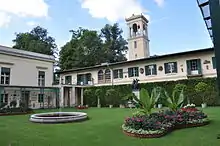 Glienicke Palace
Glienicke Palace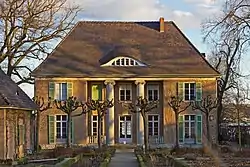 Liebermann Villa
Liebermann Villa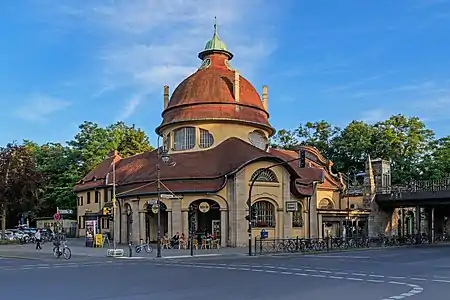 Mexikoplatz railway station
Mexikoplatz railway station Beach at the Wannsee
Beach at the Wannsee
Education
Gymnasiums
- Arndt-Gymnasium Dahlem in Dahlem
- Beethoven-Gymnasium in Lankwitz
- Dreilinden-Gymnasium in Nikolassee
- Droste-Hülshoff-Schule in Zehlendorf
- Fichtenberg-Oberschule in Steglitz
- Goethe-Gymnasium in Lichterfelde
- Gymnasium Steglitz in Steglitz
- Hermann-Ehlers-Gymnasium in Steglitz
- Königin-Luise-Stiftung in Dahlem
- Lilienthal-Gymnasium in Lichterfelde
- Paulsen-Gymnasium in Steglitz
- Schadow-Gymnasium in Zehlendorf
- Werner-von-Siemens-Gymnasium in Nikolassee
- Willi-Graf-Gymnasium in Lichterfelde
- Freie Schule Anne-Sophie Berlin in Zehlendorf
Locations for science
- American Academy in Berlin
- Biologische Bundesanstalt für Land- und Forstwirtschaft
- Centre for Modern Oriental Studies
- Charité – Campus Benjamin Franklin
- German Federal Archives - branch office Berlin: central archive of the German Reich and the GDR
- Federal Institute for Materials Research and Testing
- Freie Universität Berlin (Free University of Berlin) in Dahlem
- German Archaeological Institute
- Helmholtz-Zentrum Berlin für Materialien und Energie
- Institute for Museum Research
- Japanische Internationale Schule zu Berlin, a Japanese international school, is in the Wannsee community in Steglitz-Zehlendorf.[7]
- Krankenhaus Waldfriede
- Max Planck Society
- Prussian Privy State Archives
- Zuse Institute Berlin
Twin towns – sister cities
Steglitz-Zehlendorf is twinned with:[8]
 Brøndby, Denmark (1968)
Brøndby, Denmark (1968) Cassino, Italy (1969)
Cassino, Italy (1969) Hagen, Germany (1967)
Hagen, Germany (1967) Industrialnyi (Kharkiv), Ukraine (1990)
Industrialnyi (Kharkiv), Ukraine (1990) Kazimierz Dolny, Poland (1993)
Kazimierz Dolny, Poland (1993) Kiryat Bialik, Israel (1966)
Kiryat Bialik, Israel (1966) Königs Wusterhausen, Germany (1988)
Königs Wusterhausen, Germany (1988) Lüchow-Dannenberg, Germany (1979)
Lüchow-Dannenberg, Germany (1979) Nałęczów, Poland (1993)
Nałęczów, Poland (1993) Nentershausen, Germany (1966)
Nentershausen, Germany (1966) Poniatowa, Poland
Poniatowa, Poland Rendsburg-Eckernförde, Germany (1964)
Rendsburg-Eckernförde, Germany (1964) Ronneby, Sweden (1976)
Ronneby, Sweden (1976) Sderot, Israel (1975)
Sderot, Israel (1975) Sochos, Greece (1993)
Sochos, Greece (1993) Songpa (Seoul), South Korea (2013)
Songpa (Seoul), South Korea (2013) Szilvásvárad, Hungary (1989)
Szilvásvárad, Hungary (1989) Westerwald, Germany (1970)
Westerwald, Germany (1970) Zugló (Budapest), Hungary (2008)
Zugló (Budapest), Hungary (2008)
In 2020 Steglitz-Zehlendorf dissociated itself from its twin town of Kazimierz Dolny in Poland because the latter declared itself an LGBT free zone.[9] There is a debate about terminating the partnership.
People
- Walter Fritzsche (1895-1956), football player
- Wolfgang Krause (1895-1970), philologist
- Kurt Aland (1915-1994), theologian and biblical scholar
- Maria Sebaldt (born 1930), actress
- Nils Seethaler (born 1981), Anthropologist
References
- "Einwohnerinnen und Einwohner im Land Berlin am 31. Dezember 2020" (PDF). Amt für Statistik Berlin-Brandenburg. February 2021.
- ""Soziale Lage im Bezirk Mitte" - Der Sozialbericht Mitte 2018 ist jetzt online". www.berlin.de (in German). 21 January 2019. Retrieved 4 February 2022.
- "Chronik Zehlendorf". www.berlin.de (in German). 23 June 2021. Retrieved 18 April 2022.
- "Steglitz im Wandel der Geschichte". www.berlin.de (in German). 2 March 2020. Retrieved 18 April 2022.
- "Einwohnerbestand Berlin – Grunddaten". www.statistik-berlin-brandenburg.de (in German). Retrieved 4 February 2022.
- (in German) Steglitz-Zehlendorf on statistik-berlin-brandenburg.de
- Home page. Japanische Internationale Schule zu Berlin. Retrieved 2 January 2014.
- "Beauftragte für Partnerschaften". berlin.de (in German). Berlin. Retrieved 8 February 2021.
- Zeitung, Berliner. ""LGBT-freie Zone" in Polen: Steglitz-Zehlendorf will Partnerschaft nicht aufkündigen". Berliner Zeitung (in German). Retrieved 29 July 2020.
External links
- Official homepage (in German)
- Official homepage of Berlin
